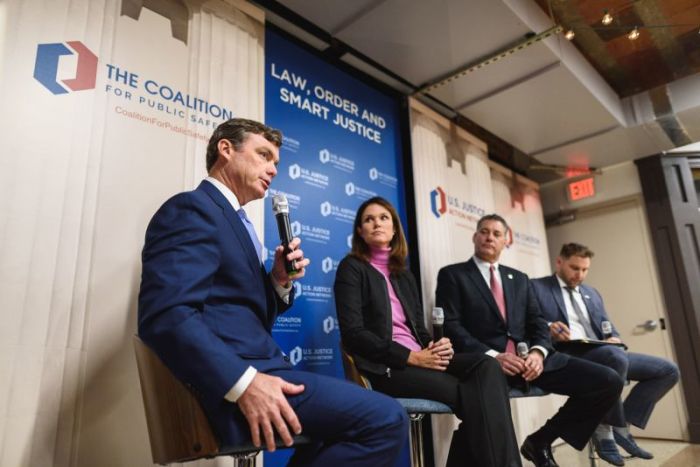2 States Where Prison Reform Is Working: What We Can Learn

WASHINGTON — Criminal justice and prison reform are increasingly becoming America's newest bipartisan issue, as politicians from both sides of the aisle have embraced and championed new reforms to state corrections systems across the nation.
At the Law, Order & Smart Justice Forum hosted by the U.S. Justice Action Network and the bipartisan Coalition for Public Safety in Washington, D.C. on Tuesday, prominent public office holders from Georgia and South Carolina detailed prison alternatives embraced by their states that have not only reduced the cost of running their states' prison systems but have also given young criminals a better chance at not becoming repeat offenders.
How Georgia Saves Millions Through Its Accountability Courts

U.S. Rep. Doug Collins, R-Georgia, gave the keynote address at Tuesday's forum and praised reforms initiated and championed by the state's Republican Gov. Nathan Deal, who took office in 2011.
"The reforms focused on prioritizing prison space for the most serious offenders," Collins, a lawyer and former member of the Georgia House of Representatives, said. "We had to begin to prioritize that we were going to have bed space for the ones we were afraid of, not the ones we were mad at. There is a difference in that look."
One such reform is the Georgia Accountability Court Program, which was created in 2012 as a way to help decrease the population in Georgia's prisons and offers non-violent offenders like drug addicts, PTSD-struggling military vets and those with a mental illness with a way to receive the mental and addiction help they need to get their lives back on track without being sent to prison.
"If anyone thinks that accountability courts are a soft way out of a mistake in life, they have never been to an accountability court," Collins asserted. "I actually worked in the accountability court, when we had DUI court in state court. My law partner was the defense attorney. Every once in awhile, I would get to go and I would watch. They would do their drug test, their monitoring, they had to pay for all this but they had to have a job."
"They had to begin the process of treatment so they would not reoffend," Collins continued. "Especially in DUI, what I saw at the end at the graduations was people who had the spark back in their eyes again. When I saw them when they began, they were not willing to be there, they were frustrated, they were mad, there was that dullness in spirit. Most made it, except those that didn't because chose not to make it. Those who wanted to invest in that program made a better life for themselves and are now back to being productive citizens again. Accountability courts take a holistic approach to Georgia's problem."
Along with helping reduce the state's incarceration rate, the accountability court and other Deal-backed reforms have also helped save the state millions of dollars, Collins said.
"The cost of holding and transferring inmates dropped from $20 million to less than $41,000 under these reforms and violent crime has actually gone down," he explained.
He added that the amount of reimbursements that local sheriff's departments seek in exchange for holding state prisoners, has also decreased.
"I found out last year that had went from $12 million in the budget to zero in a little over four-and-a-half years," Collins explained. "That shows you that things can work."
"States are our laboratories. That is what our founders intended," he added. "You can work at the state and local levels and you can see what works and what doesn't work and why it doesn't work and how we can make it better."
How South Carolina Reduced 'Youthful Offender' Recidivism By 40 Percent

Speaking at the forum during a panel discussion was Bryan P. Stirling, who was named as the director of the South Carolina's Department of Corrections by the state's Republican Gov. Nikki Haley after his predecessor, William R. Byars Jr., retired in 2013.
Although Stirling does not directly oversee the state's Department of Juvenile Justice, he is in charge of the state's "Youthful Offender Program," which is a prison alternative mentorship program offered through the state's Young Offender Parole and Reentry Services in collaboration with the Division of Behavioral Health/Substance Abuse/Mental Health for 17 to 25-year-old non-violent offenders.
In order to be eligible for the program, the offender's conviction must be a non-violent, class D or lesser felonies that are punishable by no more than 15 years in prison. In order to be a part of the program, the offenders must have a job and produce clean drug tests or they risk being sent to prison.
"They are met with a mentor (youthful offender officer), not a gun and a badge, which I truly think is the future of community corrections," Stirling explained. "They know when this mentor shows up, they are not there to take them to jail. They are there to help them deal with what is going on. Do they have an education? Do they have job? Do they have anger issues, mental health, drugs, etcetera, etcetera? And they get them the treatment and help that they want."
The difference between a "youthful offender officer" and a parole office who juggles between 250 to 400 cases is huge when it comes to helping these young adults get their lives on the right track, Stirling added.
"That mentor is in their life for probably the rest of their life," Stirling said.
Additionally, the program also enables them to have their records expunged after five years if they have no more additional convictions.
Before the "Youthful Offender" program was launched in South Carolina, Stirling said that 17 to 25 year olds who had done their time were coming back to prison at a rate of 55 percent. Now, Stirling says that the recidivism rate for 17 to 25 year olds is about 15 percent.
Although some hardline conservatives like to argue that those who embrace different forms of criminal justice reforms are "soft on crime," Stirling assures that South Carolina's "Youthful Offender Program" is anything but soft.
"There has been a bunch of folks that have said that they don't want to do [the program] because it is too hard," Stirling said. "They want to go eat three squares a day, go to sleep, watch TV and just hang out and do their two years and go home."




























